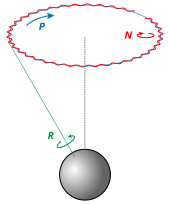Topic Tuesday #53 2013/07/23 - "Climate Cycles"
If we are to be skeptical and honest with ourselves about the world we live in, we need facts. LOTS of facts.I am going to highlight some facts that are not often brought to the table when discussing climate change. I am only going to present the items. In general this is all from the field of applied mathematics and earth sciences known as Geodesy.
Earth's Path
The earth's orbit is not circular. It is elliptical, an oval.We are closest to the Sun around January at a distance of 147,098,290 kilometres (91,402,640 mi) [0.98329134 AU] and farthest from the Sun around July at 152,098,232 kilometres (94,509,460 mi) [1.01671388 AU] Nearly 3 million miles difference.
 The reason we have seasons is due to the Earth's axial tilt. The Earth wobbles a little. Over 41,000 years, the tilt fluctuates from 22 to 24.4. The average tilt today is about 23.5 degrees, roughly in the middle of a diminishing tilt trend. The more perpendicular the planet to the Sun, the more uniform the heating, and the higher the average temperatures. Based on the current figures, the Earth will be at 22.6 degrees tilt in 8,800 years.
The reason we have seasons is due to the Earth's axial tilt. The Earth wobbles a little. Over 41,000 years, the tilt fluctuates from 22 to 24.4. The average tilt today is about 23.5 degrees, roughly in the middle of a diminishing tilt trend. The more perpendicular the planet to the Sun, the more uniform the heating, and the higher the average temperatures. Based on the current figures, the Earth will be at 22.6 degrees tilt in 8,800 years. |
| Rotation (green), precession (blue) and nutation in obliquity (red) |
The orientation (rather than the angle)of the axis changes over time following a circle with a cycle of 25,800 years. This is the determining factor between sidereal and tropical years.
These changes are known as Axial precession.
The poles also migrate (Polar Motion). The collective term for all the factors in its movement is "quasiperiodic motion". There are several periodic affects. A circular motion occurs annually while others have longer periods, one of which is the Chandler wobble with a 14 year cycle but a period of 435 days.
The rotational velocity along the axis is variable. The phenomenon is known as the length-of-day variation. Think of an ice skater, spinning with their arms in tight and then to stop they put their arms out. As the earth bulges out in the middle more, be it from continental drift or from glacier melt raising the sea level, the planet will spin slower, increasing the day.
Temporal Changes - Surface changes, and things over time.
- Plate Tectonics
- Episodic fault-line events.
- Tidal shifts
- Postglacial land uplift
- Temperature cycles: Ice age
- Material extraction
- Material relocation
- Teraforming
- Directed phase change of material. Fuel consumption
There are thousands, if not millions, of data points that go into climate science, and I don't want to blowup a single thread with all of them. Some of them, nay, most of them are deserving of a day in the sun and I will revisit them in time. Knowledge of your current situation is not enough to determine any kind of model for the future. We must study the rich past.
I hope that this has opened your eyes a little to the nature of our home planet. It is ever changing. Dynamic. Chaotic. Fragile- but only for us. It will go on spinning. The thing to remember is perspective.
"Let's be clear. The planet is not in jeopardy. We are in jeopardy. We haven't got the power to destroy the planet - or to save it. But we might have the power to save ourselves." - Ian Malcom - Jurassic Park
I hope that this has opened your eyes a little to the nature of our home planet. It is ever changing. Dynamic. Chaotic. Fragile- but only for us. It will go on spinning. The thing to remember is perspective.
"Let's be clear. The planet is not in jeopardy. We are in jeopardy. We haven't got the power to destroy the planet - or to save it. But we might have the power to save ourselves." - Ian Malcom - Jurassic Park



